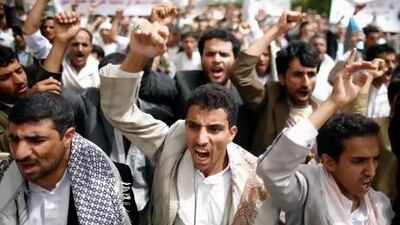DUBAI // Sunni Muslim extremists and Shiite Zaidi rebels in Yemen are waging a battle for the control of mosques, in a spillover of the sectarian face-off rattling the Middle East.
The showdown was previously confined to the northern province of Saada, a stronghold of Zaidi Ansarullah rebels who have frequently clashed with supporters of the Sunni Islamist party Al Islah since last year.
Sanaa accuses Ansarullah of being backed by Shiite-majority Iran.
With the start of the Muslim fasting month of Ramadan on July 10, frictions between the two sides have sharpened in the capital.
Sunni Salafists have been trying to seize control of a mosque led by a Zaidi imam in Sanaa, in response to a similar move by Ansarullah supporters against another mosque led by a Sunni cleric in the capital.
This has sparked clashes involving knives as well as abomb attack that wounded five people last week, according to witnesses and police.
Last Thursday, gunmen on a motorbike shot dead two Shiites and wounded four others who were staging a sit-in protest in the capital, an Ansarullah rebel told AFP.
In a bid to ease tensions, the authorities have secured a commitment from both sides "not to use force to impose their own rites in mosques," according to Hmoud Obad, the minister of religious endowments.
"In Yemen, there are no mosques for Zaidis and others for Sunnis. People have lived and prayed together for centuries, but the political polarisation taking place threatens to divide them," he told AFP.
The rebels, who belong to the Zaidi sect of Shiite Islam, are mainly concentrated in the north and make up 25 per cent of Yemen's Sunni-majority population estimated at 25 million.
The Zaidi rebels, also known as Houthis after their late leader Abdel Malek Al-Houthi, rose up in 2004 against the government of ex-president Ali Abdullah Saleh, accusing it of marginalising them politically and economically.
Thousands of people were killed in the uprising before a ceasefire was agreed in February 2010.
But their frustration was compounded by the rise to power for the first time in Yemen's history of a Sunni president, according to a participant in an ongoing national dialogue.
Abdrabuh Mansur Hadi replaced Mr Saleh, who is Zaidi, in February 2012, under a UN- and Gulf-brokered power transfer deal which led to the former strongman's resignation following 11 months of mass protests against his rule.
Despite reservations about the deal, the Zaidis are taking part in the national dialogue launched in March to draft a constitution and prepare for elections.
The participant at the dialogue, who requested anonymity, said the rebels are "trying to strengthen their growing political role by achieving a stronger presence in the mosques," warning that "sectarian tensions will intensify."
A Salafist delegate to the national dialogue, Mohammed Shibiba, accused the Zaidis of being tools in the hands of Iran and likened them to Lebanon's Shiite militant movement Hizbollah.
"Hizbollah is present in Yemen under the name of Ansarullah. They are backed by Iran which is trying to dominate Yemen," he said, charging that the Zaidis "receive military training" in the mountains.
But a representative of Ansarullah at the talks, Abdelkarim Al-Jadhban, holds Al-Islah, which is close to the Muslim Brotherhood, and its Salafist allies backed by Saudi Arabia responsible for the sectarian tensions.
"The Muslim Brotherhood and the Salafists want to take control of all mosques," including those in Saada, he said.

